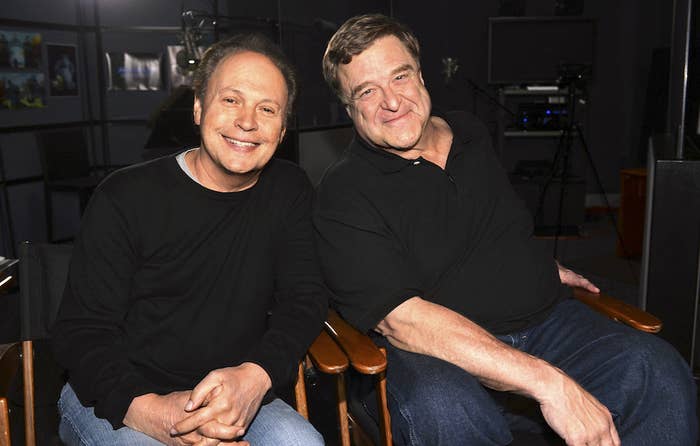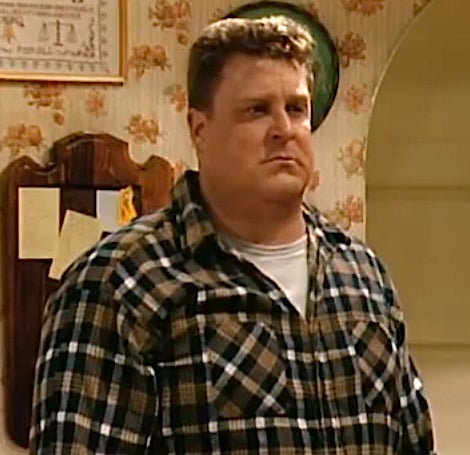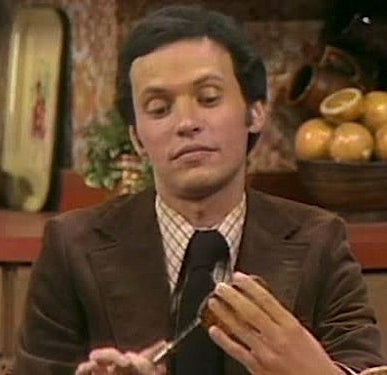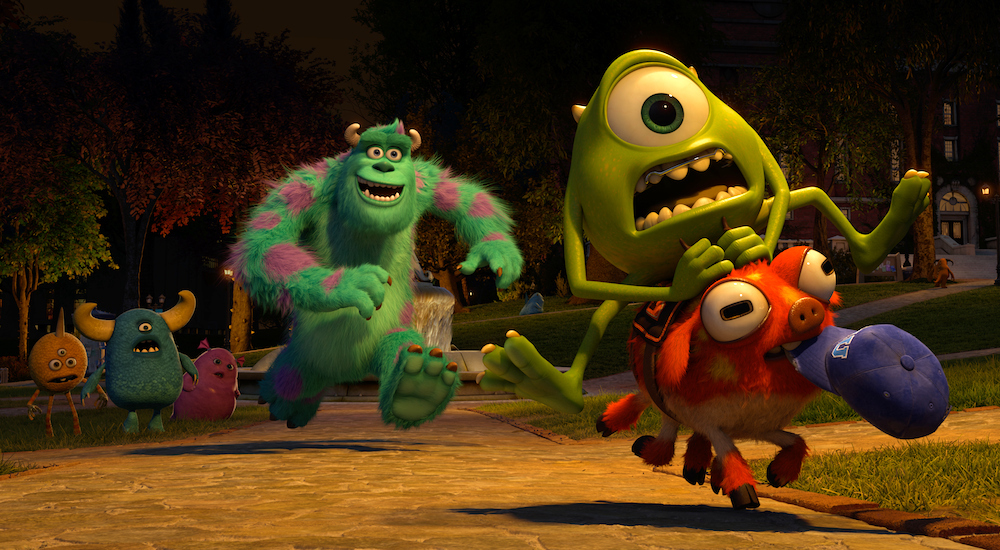
It's a rare thing when the life you first envisioned for yourself as a young kid actually comes to pass.
Disney-Pixar's Monsters University opens with an adorable peek back at the first time a very young Mike Wazowski — the one-eyed green cue ball voiced by Billy Crystal — realized what he wanted to do with his life: be a professional scarer. As it turns out, the 65-year-old Crystal was just as certain about what he wanted to do with his life from a very young age: be a professional entertainer. That clarity followed Crystal all the way to his first major break, the groundbreaking late-'70s sitcom Soap.
Most of us, however, feel more like John Goodman, whose vision for his life wasn't nearly as clear-cut as Crystal's. Before landing Roseanne in 1988, the 60-year-old Missouri native — who voices ace scarer James "Sully" Sullivan in both the Pixar prequel and the 2001 original Monsters Inc. — had a much more peripatetic attitude toward what has become a rich and varied career as one of Hollywood's most reliable and respected actors.
BuzzFeed sat down with both actors last month to talk about how they navigated their way through the life of a struggling, nobody actor — which, for Crystal, included a fateful night performing for Muhammad Ali... as Muhammad Ali.

Monsters University is about how you imagine your future when you're a kid, and then what actually ends up happening as you really figure that out in college. For you in your lives, what did you think you wanted to be when you were young?
Billy Crystal: I'm doing it. I always was a performer, from the time I was little. It was always a natural place for me to be. There's only, I think, in life, three things that I do pretty well: Performing, I still can field ground balls, and I make nice kids. That's pretty much what I do. Everything else has always been like, "I'll get to that."
John, did you always think you were going to be an actor?
John Goodman: It's funny. I'd get kicked out of class, and they'd kick me out to the library, and I'd read plays. I have no idea why. That's always kind of mystified me. I was always drawn to performing, but I never thought I could. I have no idea what I wanted to do outside of the old cowboy-or-fireman. When I was in college, I got serious about acting. I started examining history and then everything related to the theater. History, art, all the other studies, if I could link them into the theater, then it became alive for me. It just opened up my eyes.
Correct me if I'm wrong, but I'd read that both of you went to college on sports scholarships, at least initially?
JG: No. I'd like to lie and say that I did.
Did you play football at all?
JG: I played in high school. I got hurt my senior year. I wasn't really very good, to be honest with you. I didn't have the drive that I needed to compete, but I liked being on a team. I liked playing sports, and I wanted to go to try to walk on the football team where I went to college, and I just didn't have the grades. Then by the next year, I'd discovered theater.


Did you play sports in college, Billy?
BC: I was a baseball player, yeah. I left after my freshman year. My dad had just passed away, so I felt I needed to be closer to home. But at this junior college that I went to — Nassau Community College in Garden City, Long Island [New York] — they had a phenomenal theater department, and that was it. I just started working, working, working. We formed our own summer stock company, and we built our own theater in an old airplane hangar at a place called Roosevelt Field right near where [Charles] Lindbergh took off on his flight to Paris. It was an old Air Force base where the college had its campus, and we renovated this airplane hangar with the huge doors and made it an indoor-outdoor theater for the summer. The doors would open up and people would sit on the runway at the old Air Force base and watch the shows. I was the leprechaun in Finian's Rainbow, one of the great musicals of all time. I directed The Apple Tree. I did Rosencrantz in Rosencrantz and Guildenstern Are Dead. We had 2,500 people a night, and that's where I got my Actors Equity Card. We formed our own company.
JG: Did you guys come up with it yourself?
BC: Yeah. The head of the theater department, I still keep in touch with him, an amazing guy named Wes Jensby. This was his idea, and it's called the Alumni Theater Group. It was a two-year school, so anyone who went on was eligible to audition for the company. We did five plays in residence for the summer, in repertory, and it was great. That became my fraternity house; that became my extended family. Because I was working in the summers all the time, then baseball went away, as stuff falls away. You know when they mount a camera on a missile? And the missiles leave the Earth and they go up and they look back, and some stages fall away and then you're left in your orbit? That's how I think of my life sometimes. The stuff that gets you up, then falls away, then you find something else as you get in your orbit. Then I went to [New York University] Film School, and that was good, but I still needed to get onstage. I was really very shy in that way. Then I formed this comedy group with two other friends. I was still hiding, and then after about four years of that, my wife and I already had a baby. I said, "Guys, I gotta go on my own." I left and never looked back.

John, you just said that you had never thought that you could do acting. Was there any particular reason why?
JG: It just seemed exotic, too exotic. By the time I did move to New York, half of me fully expected to come back to St. Louis and work at the brewery or something, but I knew that if I didn't try that I'd regret it for the rest of my life. Regret it badly. So I took a shot, and things worked out.
Did you first go through all four years of college?
JG: I graduated and then about a month later took a train to New York.
Billy obviously created a foundation for himself. How did you wend your way through the process of starting out?
JG: Friends. I had one friend in New York that I knew. He taught me how to go to auditions. They were all non-Equity musical theater auditions. Just finding your way around. New York was just so scary and magical, and going to hell in a handbasket at the time.
BC: What year did you come?
JG: August of '75. Before the city dropped dead. But I wouldn't trade it for anything. I was frightened all the time: "Gneehaaah, what am I gonna do?" But it was the best.
BC: What was your first play that you did?
JG: I went out of town to do Thomas Jefferson in 1776. Then I tried to get hired at dinner theater again for their summer. My girlfriend got hired, but they wouldn't hire me, so I went on, waited tables, mowed their lawn, did all the odd jobs, and wound up making more than anybody. I paid off my college loans, but I got my Equity Card when I went back to New York that fall.
Once you get your Equity Card, I imagine there's this feeling of, "OK, I've made it," and then you realize, "No, there's still so much more work to do."
JG: It's such a load off your mind when you get it, though.
BC: Yes, it is. That, and then the agent is the next step. That eternal question: "How do you get an agent if you don't have a job? How do you get a job if you don't have an agent?" Oh god. It's so lucky sometimes. It's just by chance. For me, I had a basis of stand-up that I could always, you know, you have something solid to fall back on.
JG: (laughs)
BC: But you had a place to be seen. I had a place I could say, "Well, are you in anything?" I'd say, "Well, I'm going to be at the improv at 10:20. You can see me." Something like that. I could sing a little bit, and I could dance a little bit, so I was auditioning for musicals. I was the house manager at You're a Good Man, Charlie Brown for three years.
JG: Holy cow.
BC: Yeah. Theatre 80. St. Marks.
JG: Wow.
BC: I was going to college. I lived on East 5th Street, and that was on 8th Street, and I knew all the parts: Snoopy, Linus, Schroeder, Charlie. Never got on.
View this video on YouTube
Billy Crystal's tribute to Muhammad Ali celebrating the boxer's 50th birthday.
When did TV enter the picture for you both? Did you think when it did that that was a possibility for you? Like, as you were going through your early stages of doing all that theater, you thought, I want to make it onto TV?
BC: For me, yeah. For me, it was mostly as a stand-up. The first TV performance I ever did was a local special. It was only seen in three states, but it became a big deal. There was a magazine called Sport Magazine, and Muhammad Ali had just beaten George Foreman in the Rumble in the Jungle and regained the heavyweight title. Dick Schaap, who became one of my best friends, was the editor of Sport Magazine. They were televising what they called the Sportsmen of the Year dinner, which was going to honor Ali. I was still a substitute teacher, and he called my agent looking for Robert Klein, who was a great comedian who did a lot of sports stuff.
He said, "Well, I don't have Robert — he's out of town — but I got this young guy who does this great imitation of Muhammad Ali," which I did at the time. They called me. "Would you come and do this thing?" I said, "Where?" "The Plaza Hotel. It's Friday night." "OK. Yeah. Do you want to hear the Ali on the phone?" Dick said, "No. I'll see you when I see you, Friday."
So I threw together a tuxedo. I didn't have one. I had this black velvet suit. I bought a bow tie that looked like I had a tarantula on my neck. I come to the Plaza Hotel so nervous, and everyone's in a tie and jacket. I really looked like a schmuck. They seat me on the dais, and there's Ali, this close! He's 33.
JG: Oh my god.
BC: Dick said, "How should I introduce you?" I said, "Just say I'm one of Ali's closest and dearest friends." Doing Howard Cosell was the other part; it was how I'd interview Muhammad Ali. I did it, and it went through-the-roof great. Here was this little, white, Jewish guy doing Ali, who was sitting right next to me at the podium. Every sports giant was there. Neil Simon spoke. It was just like a dream. It got picked up a couple places, and then a few weeks later, I did my first Tonight Show.
So do you feel, in hindsight, that that was really a flash point for you?
BC: That, and then just getting better at stand-up. I started being on shows a lot. That led to Soap.
View this video on YouTube
A Foot Locker ad from 1981 starring John Goodman.
John, did anything similar happen to you, where you realized you had crossed a threshold of attention and interest in you and your talent?
JG: No. I'd been lucky. I did a Broadway show, then I did three movies in a row, and I had a pretty good movie career going on. Then I think I did a couple of pilots, but I knew they sucked and I was just going to get the payday off of them. The pilot'll never go, nobody'll ever see it. Then they called me in for Roseanne, and I went and I read it. I just knew I had it there because we just got along so well.
Finally, was there a moment for either of you, and maybe we've just discussed it, where you realized you weren't starting out anymore, that you had moved from having to hustle to get where you wanted to be to realizing, Oh, yeah, now I am where I kind of want to be?
BC: I never feel that way.
Really?
BC: (Nods) And I think it's healthy. To me, once you've arrived, then there's no place to go. I always feel like I still have something to — that's why I like Mike Wazowski so much. I still feel like I've got something to prove, I still feel like I've gotta get better, I still feel like I'm getting better, and getting to understand it even more in a way. I'm just not as scared. I have more chops. I know that. But I don't think I ever feel comfortable. I don't think that's a good place to feel, for me.
John, did you ever feel that way?
JG: Yeah, I did, and then I got in trouble. Early on, I got really lucky with television commercials. But there was also that feeling of, "Yeah, but you're doing commercials." It just wasn't good enough. I still wanted to act. There was a point where I started getting complacent, and I lost the hunger, and it was bad. It wasn't good. Started to get bored with everything.
What rekindled things for you?
JG: I'll be honest with you: I quit drinking. That was a big problem for a lot of years. Then after that, I just started feeling grateful again.
This interview has been lightly edited and condensed.


